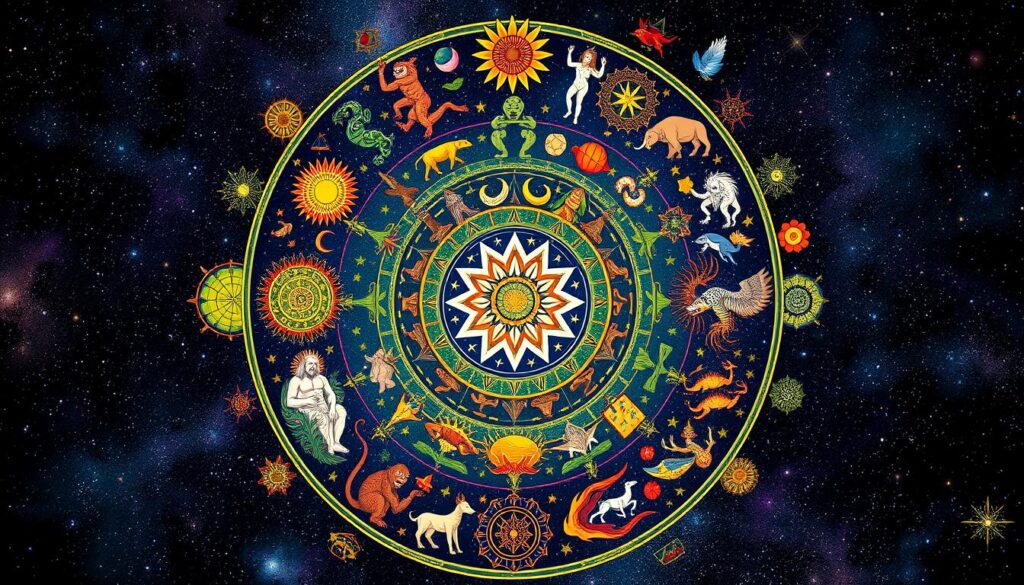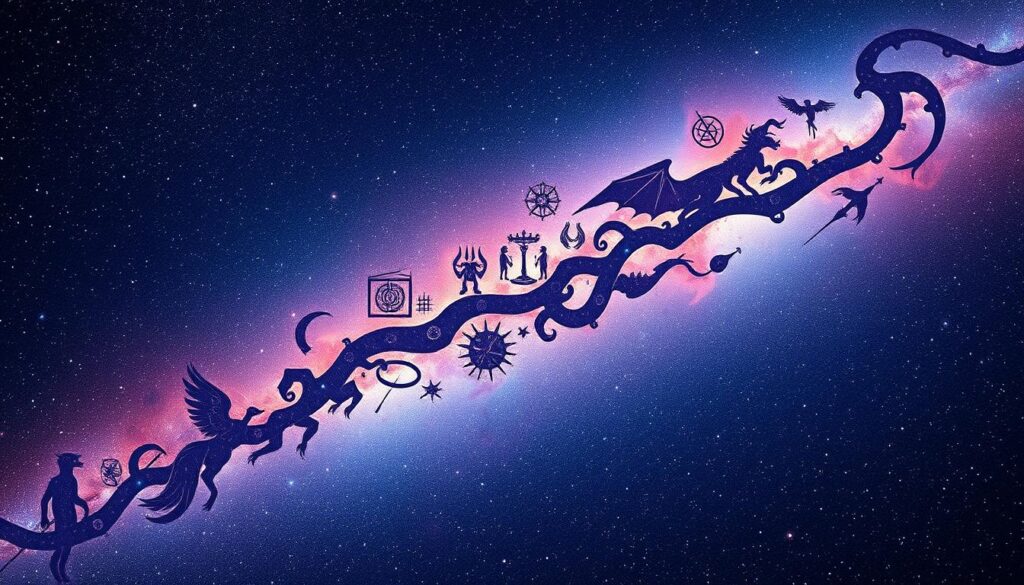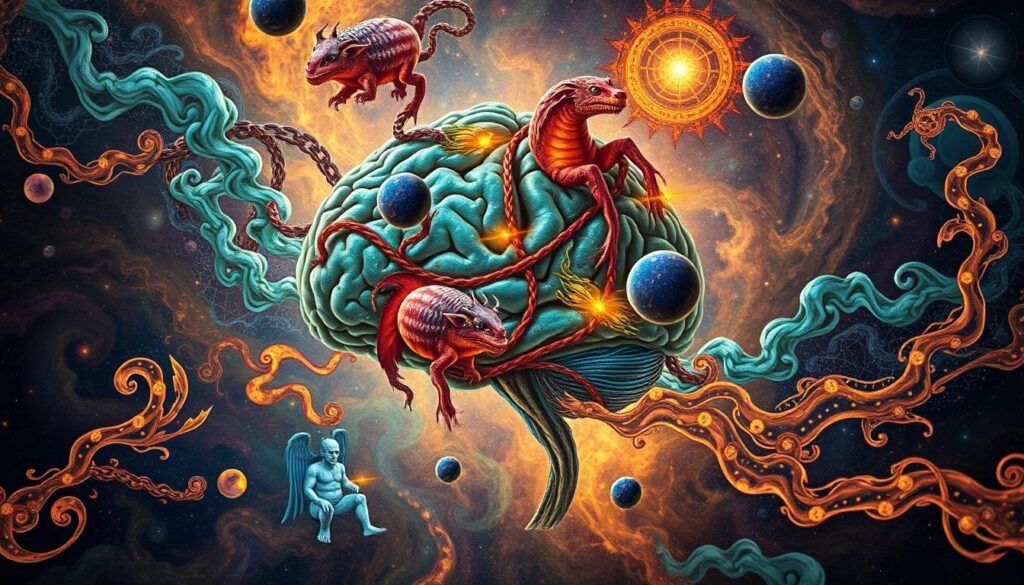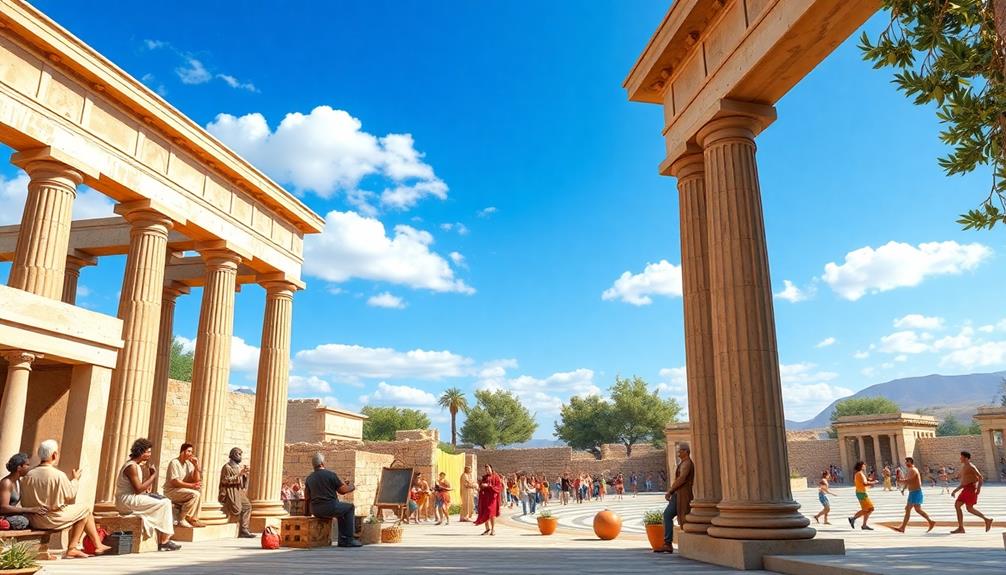Creation myths captivate us with their grand tales of the universe’s origins. These stories are more than just fiction. They offer insights into the human experience and our place in the world.
Cosmogonic myths serve as windows into our shared humanity. Through these narratives, we can explore the deeper truths that shape our understanding of existence.
These symbolic stories have long influenced our worldviews and origin stories. They reveal how different cultures make sense of life’s biggest questions.
Key Takeaways
- Creation myths are symbolic narratives that explain the beginning of the world within a particular tradition or community.
- These myths are central to shaping human orientation in the universe and the basic patterns of life and culture.
- Creation myths attempt to reveal humanity’s deepest truths, providing a framework for self-identity and worldview.
- Myths express our shared experiences, values, and even prejudices through imaginative storytelling.
- Understanding creation myths can offer insights into the cultural and psychological dimensions of human nature.
What is a Creation Myth?
Creation myths are powerful stories about humanity’s place in the world. They describe how the universe, Earth, and life began. These tales often involve supernatural beings and their extraordinary deeds.
Creation myths shape our understanding of the world. They guide our relationships with nature, spirituality, and each other. These stories reveal deep truths about human existence.
Definition and Purpose
Creation myths are philosophical and theological versions of primal myths. They tell of events from the “primordial Time” of beginnings. These stories show how reality came into existence through various characters’ actions.
These mythological narratives are more than just facts. They reveal central worldviews and frameworks for self-identity within societies. Creation myths help people understand their place in the world.
Structure and Common Features
Creation myths have distinct plots and characters who undergo transformative journeys. They’re set in a vague past called “at that time” (in illo tempore). This creates a sense of sacred history.
These mythological tales answer deep questions meaningful to their communities. They provide a birth story that defines humanity’s role in the world. Creation myths develop through oral traditions.
Multiple versions of these myths exist across diverse cultures. Yet, they share common elements reflecting their role in shaping worldviews. These stories guide how people relate to their environment and each other.
“Creation myths are the foundation of a culture’s worldview, providing a framework for understanding our place in the cosmos and relationship to the divine.”
Classification of Creation Myths
Mythology scholars have created various ways to group creation stories from different cultures. These groupings help us understand the diverse range of creation myths. One common system identifies five basic types of creation myths:
- Creation ex nihilo (from nothing)
- Earth-diver creation
- Emergence myths
- Creation by the dismemberment of a primordial being
- Creation by the splitting or ordering of a primordial unity
Another classification system focuses on common themes in creation stories. These themes include:
- A primeval abyss or chaos
- An originator deity
- A cosmic egg or embryo
- Life generated from the corpse or dismembered parts of an originator deity
These groupings reveal shared structures in creation myths from different traditions. They show patterns across vastly different geographical regions. By spotting these patterns, mythologists gain insights into universal human experiences.
These stories reflect how people view the world’s origin and humanity’s place in it. They help us understand the basics of human existence and cultural values.

“Myths are sacred stories reflecting and reinforcing a community’s worldview. They explain the fundamentals of human existence, purpose, and cultural values.”
Ex Nihilo: Creation from Nothing
The concept of ex nihilo is crucial to Judaism, Christianity, and Islam. It means God created the world from nothing. By the 3rd century CE, this idea became a key part of Christian belief.
Ancient Egyptian, Vedic, and animistic stories also feature ex nihilo creation. In these tales, a deity creates the world through speech, dreams, breath, or thought.
Abrahamic Traditions and Ex Nihilo
The creatio ex nihilo doctrine emerged around 200 A.D. It developed during debates with gnostics, Stoics, and Middle Platonists. This idea of God’s power to create from nothing became central to early Christian theology.
Ex Nihilo in Other Cultures
Many non-Abrahamic myths describe creation through a deity’s bodily secretions. The term “ex nihilo” can be flexible in these stories. It may involve changing a primordial substance rather than creating from absolute nothingness.
These varied cultural views show how humans try to grasp cosmic origins. They reflect our attempts to understand our place in the universe.
| Tradition | Creation Myth |
|---|---|
| Abrahamic | God creates the world out of nothing (ex nihilo) |
| Hindu | The world is brought into being through the bodily secretions of a creator deity |
| Animistic | The world is created through the speech, dream, breath, or pure thought of a creator |
“Myths have evolved over time to encompass time-tested themes that address human universals that permeate day-to-day life.”
The Milky Way: A Cosmic Roadmap
The Milky Way has sparked human imagination for centuries. It has inspired mythological stories across various cultures. Ancient Greeks, Romans, Andean peoples, and Māori have all attributed profound meaning to this celestial river.
Greek and Roman Myths
Greek mythology saw the Milky Way as Hera’s spilled milk. Romans called it “Via Lactea” or the “Milky Way”. These myths show how humans connect with the cosmos and find their place in it.
Rivers of Stars
Many cultures see the Milky Way as a celestial river. In India, it’s the “Heavenly Ganges”. China calls it the “Silver River”, separating star-crossed lovers.
Andean peoples view it as Mayu, a great river. The Māori and other Oceanic cultures see it as a river of stories or a sky shark.
These river myths show how we project earthly features onto the cosmos. They reveal our shared tendency to find meaning in the night sky.

“The Milky Way inspires awe, humility, and a yearning for deeper understanding, instilling feelings of endless possibilities and infinite wisdom found in the cosmos.”
Myths Reveal Humanity’s Deeper Truths
Milky Way tales across cultures offer profound insights into shared human experiences. People worldwide use similar images to understand the cosmos. These stories reveal our universal need for meaning in the universe.
The galaxy is often seen as a celestial road, star river, or majestic animal. These shared motifs show how we connect nature with deeper meaning. They link us through our fascination with cosmic mysteries.
From California’s Chumash to New Zealand’s Māori, the Milky Way inspires wonder. Ancient Greeks and Amazon tribes share this fascination. These myths offer insights into experiences shaping our collective identity.
“The Milky Way is not just a collection of stars, but a tapestry of shared human mythology that binds us together across cultures and time.”
Milky Way myths showcase human cultural diversity and unity throughout history. They remind us we’re all part of a shared cosmic journey. Our awe of the universe unites us despite our differences.
These stories reflect our universal experiences and search for meaning. As we explore the cosmos, we see our myths as more than tales. They’re windows into our shared human experience.
Cooperation: The Key to Human Success
Anthropologist Agustín Fuentes’ research reveals cooperation as the secret to our species’ evolutionary success. His studies show that humans thrive through cooperation, not hostility. Our ability to work together has made us the dominant large animal on Earth.
The myth of an innate human “beast within” doesn’t hold up scientifically. Instead, our large brains and exceptional teamwork have driven humanity’s remarkable evolution. These factors, not aggression, explain our species’ incredible journey.
Aggression is Not Our Default
Compared to our closest primate relatives, aggression is rare in humans. Chimpanzees can be highly territorial and violent, attacking rival groups. In contrast, bonobos use peaceful, cooperative, and even sexual strategies to resolve conflicts.
Fuentes’ research shows cooperation trumps competition in human evolution. Our ancestors didn’t dominate through force. Instead, they excelled at collaborating, sharing resources, and building complex social structures. These skills drove our evolutionary success.
“Cooperation, not aggression, is the default mode that has allowed humans to thrive as the most successful large animal on the planet.”
| Characteristic | Chimpanzees | Bonobos | Humans |
|---|---|---|---|
| Territorial Behavior | Highly Territorial | Less Territorial | Cooperative Territoriality |
| Conflict Resolution | Violent Attacks | Sexual Conflict Resolution | Complex Social Structures |
| Evolutionary Success | Limited | Limited | Unprecedented |
Fuentes’ work dispels the myth of human aggression as our innate default. It highlights cooperation’s central role in our species’ remarkable evolution. This truth about human nature is crucial for navigating today’s complex challenges.

Debunking Myths About Human Nature
Research has disproven common beliefs about human nature. Aggression, strict gender roles, and racial divisions aren’t inherent human traits. These ideas are myths, not scientific facts.
The Myth of Race
Humans can’t be divided into distinct biological races. Geneticists have found no genetic basis for racial categories. This false idea has caused harm and hindered human understanding.
Race is a social construct, not a biological reality. It has fueled intolerance and created barriers to cooperation among people.
The Myth of Aggression
Humans aren’t naturally violent beings. Our ability to cooperate has been key to the success of human societies. The idea of an inner “beast” isn’t backed by science.
Believing aggression is natural can harm relationships. It may create fear and normalize abusive behavior.
The Myth of Sex Differences
Science doesn’t support the idea of fundamental biological differences between men and women. Humans can adapt to various social and sexual arrangements. The belief in fixed sex differences can harm gender relations.
This myth supports sexual inequality. It creates unrealistic expectations that people feel pressured to meet.
Challenging these myths leads to a better understanding of our shared humanity. It helps us work towards a world with more tolerance, cooperation, and equality.

Travel and Cultural Diversity
Traveling reveals the incredible diversity of successful ways of being human worldwide. From Micronesia to New Guinea, people’s adaptations and worldviews are awe-inspiring. Yet, we share unifying human experiences that connect us all.
We all seek meaning in the cosmos and create grand narratives. Humans cooperate to survive and prosper, regardless of cultural differences. These shared traits bind us together as a species.
Anthropologist Agustín Fuentes notes that travel shows both human diversity and common elements. New cultures may seem foreign at first. But by embracing cultural relativism, you’ll uncover the wisdom in these lifestyles.
| Destination | Unique Cultural Practices | Unifying Human Experiences |
|---|---|---|
| Micronesia | Canoe building, traditional navigation techniques, seafaring lifestyle | Storytelling, community-oriented values, connection to the natural world |
| New Guinea | Elaborate body adornment, ritualized exchange systems, communal decision-making | Belief in the sacred, reverence for ancestors, emphasis on cooperation |
| Europe | Diverse architectural styles, vibrant cultural festivals, deep-rooted culinary traditions | Appreciation for art and history, celebration of shared European heritage, sense of exploration and adventure |
Immersing in diverse cultural experiences shows the many successful ways of being human. You’ll witness ingenuity and resilience firsthand. From Micronesian canoe-building to New Guinea’s communal practices, human spirit shines.
Amidst diversity, unifying human experiences transcend boundaries. We all seek meaning and revere the sacred. Cooperation for survival is universal, binding us together despite outward differences.

“Travel reveals both the breadth of human variation and the common elements that bind us together.”
Keep an open mind as you explore the world. Embrace cultural relativism to truly appreciate human diversity. You’ll discover the successful ways of being human that help us thrive globally.
Observing Primates and Human Behavior
Anthropologist Agustín Fuentes closely observes primates to gain insights into human behavior. He uses Crittercam technology to capture unique glimpses of these animals’ daily lives. This innovative approach helps uncover new perspectives on our evolutionary origins.
Fuentes watches macaques navigate their environment, revealing surprising behaviors. He observes them pausing to watch traffic or gazing at scenic views. These observations challenge typical assumptions about primate behavior.
By studying organisms in their natural habitats, Fuentes seeks to understand human behavior better. This method helps him explore the true nature of our evolutionary foundations.
Crittercam Studies
Fuentes often uses Crittercam, a special camera system, in his research. It documents primates’ daily activities in their natural habitats. This technology provides a unique view into primate behavior and human-animal interactions.
Crittercam captures footage from the animals’ perspective. This reveals new perspectives on daily life that challenge common beliefs. Fuentes’ work with this tech has led to groundbreaking discoveries.
These studies offer insights into primate social dynamics and cognitive abilities. They also show how our closest relatives adapt to their environment.
“Watching a male macaque pause to observe the flow of traffic on a footbridge or position itself to gaze out over the Mediterranean provides insights that go beyond typical assumptions.”
Fuentes’ research transforms our understanding of human-primate relationships. His work with Crittercam technology sheds light on primate behavior complexities. It expands our knowledge and challenges what we think it means to be human.

The Power of Myths in Everyday Life
Myths shape our behaviors, beliefs, and assumptions in powerful ways. They often stem from false ideas and incomplete information. These myths can have far-reaching historical consequences.
Consider the stereotype about men not asking for directions. It’s based on the myth of male spatial reasoning skills. This myth comes from the flawed “man the hunter” narrative, which lacks evidence.
Myths in everyday life can reinforce behaviors and justify prejudice. They’ve been used to deny women voting rights and rationalize racial segregation.
Fuentes exposes false assumptions and historical consequences of these myths. He challenges ingrained beliefs that perpetuate social injustice. His work shows how myths shape our lives and why questioning assumptions is crucial.
“Myths are not meant to be taken literally; they are metaphors representing the mysteries of existence and provide profound understanding of our internal journeys.”
Mythology bridges spiritual and philosophical realms. It offers a language for expressing deep spiritual truths beyond rational thought. By embracing myths, we can find deeper meaning and navigate life’s challenges.

Our society has suppressed the mythopoetic aspect of creativity. Fuentes reminds us of the myths in everyday life that shape our experiences. By challenging false assumptions and stereotypes, we can unlock myth’s transformative power.
Questioning Assumptions and Myths
Agustín Fuentes challenges our understanding of human nature. He uses anthropological insights to encourage evidence-based thinking. Fuentes urges us to move beyond simplistic explanations of the human experience.
Many “common sense” beliefs stem from incomplete information and cultural biases. Fuentes explores anthropology, biology, and psychology to debunk long-held myths. His work deconstructs assumptions dominating our collective consciousness.
“Humans cannot live without illusions, according to philosopher John Gray, who argues that an irrational faith in progress is necessary to combat nihilism.”
Fuentes’ research promotes open-mindedness and challenging the status quo. This approach helps us gain a nuanced understanding of human complexities. By re-examining our beliefs, we can refine our knowledge of humanity.
- Probability of humans living with illusions: Gray suggests that humans cannot live without illusions, implying a high likelihood that individuals hold onto unrealistic beliefs.
- Percentage of individuals relying on hope for a better future: Gray argues that an irrational faith in progress is necessary for combating nihilism, indicating that a significant portion of society may rely on this belief to move forward.
- Occurrence rate of questioning established beliefs: Gray’s book aims to challenge preconceived notions and conventional wisdom, suggesting that there may be a growing trend in questioning commonly accepted ideas.
- Comparison between humanists’ belief in progress and religious beliefs: Gray highlights that humanists cling to the concept of progress as a form of faith, echoing the intensity of religious beliefs in the past.
- Shift from action-oriented to contemplative life views: Gray discusses the traditional aim of life being contemplation rather than changing the world, indicating a shift in perspectives may be occurring in society.

Fuentes’ approach helps us challenge our assumptions and broaden our perspectives. This commitment to challenging assumptions and critical thinking is crucial. It ensures our knowledge stays grounded in evidence and our beliefs continue to improve.
Conclusion
Myths reveal profound truths about human experience through symbolic narratives. They shape our worldviews, self-identity, and relationships with nature and spirituality. Examining creation myths and Milky Way mythologies offers insights into shared values and prejudices.
Anthropologist Agustín Fuentes challenges us to question our assumptions about human nature. He emphasizes cooperation as the foundation of our evolutionary success. This perspective helps us uncover deeper truths about the human experience.
Exploring myths invites us to see the world differently. It helps us understand our shared heritage and values. This exploration reveals the richness of the human spirit and our extraordinary potential.









